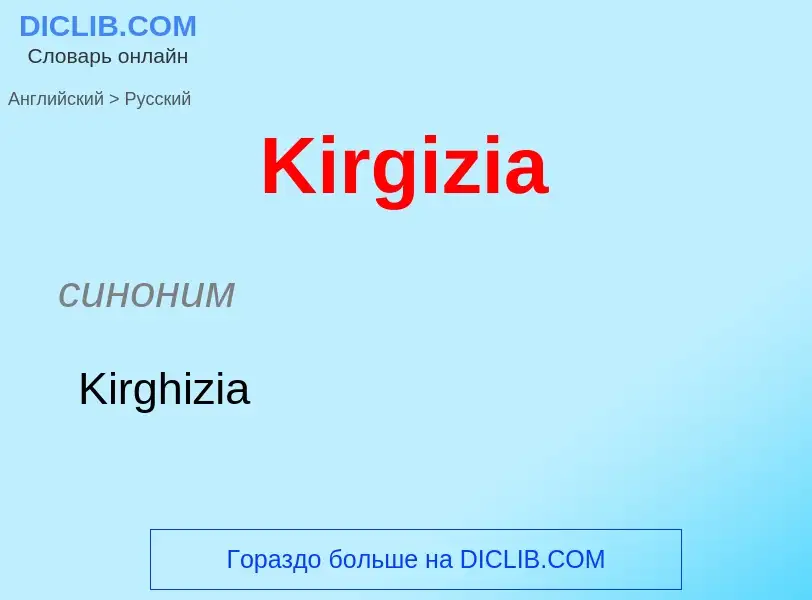Перевод и анализ слов искусственным интеллектом ChatGPT
На этой странице Вы можете получить подробный анализ слова или словосочетания, произведенный с помощью лучшей на сегодняшний день технологии искусственного интеллекта:
- как употребляется слово
- частота употребления
- используется оно чаще в устной или письменной речи
- варианты перевода слова
- примеры употребления (несколько фраз с переводом)
- этимология
Kirgizia - перевод на русский
синоним
[kə:'gi:ziə]
существительное
география
Киргизия
синоним
Википедия
Kyrgyzstan or the Kyrgyz Republic is a landlocked country in Central Asia. Kyrgyzstan is bordered by Kazakhstan to the north, Uzbekistan to the west, Tajikistan to the south, and the People's Republic of China to the east. Its capital and largest city is Bishkek.
Ethnic Kyrgyz make up the majority of the country's 6.6 million people, followed by significant minorities of Uzbeks and Russians. The Kyrgyz language is closely related to other Turkic languages.
Kyrgyzstan's history spans a variety of cultures and empires. Although geographically isolated by its highly mountainous terrain, Kyrgyzstan has been at the crossroads of several great civilizations as part of the Silk Road along with other commercial routes. Inhabited by a succession of tribes and clans, Kyrgyzstan has periodically fallen under larger domination, for example the Turkic nomads, who trace their ancestry to many Turkic states. It was first established as the Yenisei Kyrgyz Khaganate later in the 13th century. Kyrgyzstan was conquered by the Mongols; it regained independence, but was later invaded by Dzungar Khanate. After the fall of Dzhungars, Kyrgyz and Kipchaks were an integral part of Kokand Khanate. In 1876, Kyrgyzstan became part of the Russian Empire, and in 1936, the Kirghiz Soviet Socialist Republic was formed to become a constituent republic of the Soviet Union. Following Mikhail Gorbachev's democratic reforms in the USSR, in 1990 pro-independence candidate Askar Akayev was elected president. On 31 August 1991, Kyrgyzstan declared independence from Moscow and a democratic government was established. Kyrgyzstan attained sovereignty as a nation state after the breakup of the Soviet Union in 1991.
After independence, Kyrgyzstan was officially a unitary presidential republic; after the Tulip Revolution it became a unitary parliamentary republic, although it gradually developed an executive president and was governed as a semi-presidential republic before reverting to a presidential system in 2021. Throughout its existence, the country has continued to endure ethnic conflicts, revolts, economic troubles, transitional governments and political conflict.
Kyrgyzstan is a member of the Commonwealth of Independent States, the Eurasian Economic Union, the Collective Security Treaty Organization, the Shanghai Cooperation Organisation, the Organisation of Islamic Cooperation, the Organization for Security and Cooperation in Europe, the Organisation of Turkic States, the Türksoy community and the United Nations. It is a developing country ranked 118th in the Human Development Index, and is the second poorest country in Central Asia. The country's transitional economy is heavily dependent on deposits of gold, coal and uranium.

![Kyrgyz writer Kenesh Jusupov and General Beishe Moldogaziev with villagers, On-Archain, [[Naryn Region]] Kyrgyz writer Kenesh Jusupov and General Beishe Moldogaziev with villagers, On-Archain, [[Naryn Region]]](https://commons.wikimedia.org/wiki/Special:FilePath/At the On-Archa village in Naryn district. Kyrgyzstan. 04.10.2012.jpg?width=200)
![[[Bishkek]] [[Bishkek]]](https://commons.wikimedia.org/wiki/Special:FilePath/Bischkek.jpg?width=200)
![unicameral parliament]] unicameral parliament]]](https://commons.wikimedia.org/wiki/Special:FilePath/Bishkek P9170503 192 (39204123095).jpg?width=200)
![Bishkek [[Eastern Orthodox Church]] Bishkek [[Eastern Orthodox Church]]](https://commons.wikimedia.org/wiki/Special:FilePath/Bishkek church 01.jpg?width=200)
![On the southern shore of Issyk Kul lake, [[Issyk Kul Region]] On the southern shore of Issyk Kul lake, [[Issyk Kul Region]]](https://commons.wikimedia.org/wiki/Special:FilePath/Bringing the sheep home, on the southern shore of Issy-Kol. (3968109583).jpg?width=200)


![Kyrgyzstan's second-largest city, [[Osh]], in 2018 Kyrgyzstan's second-largest city, [[Osh]], in 2018](https://commons.wikimedia.org/wiki/Special:FilePath/From Sary Tash to Osh, Kyrgyzstan (43654601644).jpg?width=200)
![Group of Kirghiz men posing with a local Russian Governor, his wife, and their child in front of a [[yurt]] Group of Kirghiz men posing with a local Russian Governor, his wife, and their child in front of a [[yurt]]](https://commons.wikimedia.org/wiki/Special:FilePath/Group of Kirghiz (i.e. Kazakh) men posing with a local Russian Governor, his wife, and their child in front of a yurt LCCN99615493.jpg?width=200)
![Hunting with an eagle]] Hunting with an eagle]]](https://commons.wikimedia.org/wiki/Special:FilePath/Ishenbek and Berkut scout for prey. (3968888530).jpg?width=200)
![Southern shore of [[Issyk Kul Lake]] Southern shore of [[Issyk Kul Lake]]](https://commons.wikimedia.org/wiki/Special:FilePath/Issyk-Kulmeer.jpg?width=200)
![Karakol Dungan Mosque]] Karakol Dungan Mosque]]](https://commons.wikimedia.org/wiki/Special:FilePath/Karakol-Dungan-Mosque-Exterior-1.jpg?width=200)



![Kyrgyz family in the village of Sary-Mogol, [[Osh Region]] Kyrgyz family in the village of Sary-Mogol, [[Osh Region]]](https://commons.wikimedia.org/wiki/Special:FilePath/Kyrgyz family Sary-Mogol.jpg?width=200)
![traditional script]] in use from the 13th century to 1920 traditional script]] in use from the 13th century to 1920](https://commons.wikimedia.org/wiki/Special:FilePath/Kyrgyz traditionalscript 2.jpg?width=200)


![Kyrgyz Ala-Too]] Kyrgyz Ala-Too]]](https://commons.wikimedia.org/wiki/Special:FilePath/Kyrgyzstan Mounts Kyrgyz Ala Too 001.jpg?width=200)

.jpg?width=200)

![Street scene in [[Osh]] Street scene in [[Osh]]](https://commons.wikimedia.org/wiki/Special:FilePath/Osh 03-2016 img07 Gapar Aitiev Street.jpg?width=200)
![Bazar in [[Osh]] Bazar in [[Osh]]](https://commons.wikimedia.org/wiki/Special:FilePath/Osh Bazar.jpg?width=200)
![President Jeenbekov at the [[Shanghai Cooperation Organisation]] summit in China, June 2018 President Jeenbekov at the [[Shanghai Cooperation Organisation]] summit in China, June 2018](https://commons.wikimedia.org/wiki/Special:FilePath/SCO summit (2018-06-10) 7.jpg?width=200)
![Wild sheep, [[urial]], on a Kyrgyzstan stamp Wild sheep, [[urial]], on a Kyrgyzstan stamp](https://commons.wikimedia.org/wiki/Special:FilePath/Stamps of Kyrgyzstan, 2011-05.jpg?width=200)
![Nomadic farming in the [[Suusamyr Valley]], Kyrgyzstan Nomadic farming in the [[Suusamyr Valley]], Kyrgyzstan](https://commons.wikimedia.org/wiki/Special:FilePath/Suusamyr Valley (3968060227).jpg?width=200)

![Otunbayeva]] meets representatives of an environmental organisation in 2011. Otunbayeva]] meets representatives of an environmental organisation in 2011.](https://commons.wikimedia.org/wiki/Special:FilePath/Президент Киргизии и представитель НАБУ.jpg?width=200)
![Sadyr Japarov, [[President of Kyrgyzstan]] Sadyr Japarov, [[President of Kyrgyzstan]]](https://commons.wikimedia.org/wiki/Special:FilePath/Садыр Жапаров (05-11-2021).jpg?width=200)
